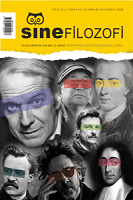Béla Balázs’ın Kavramlarıyla Sinemayı Anlamak: ‘Yakın Çekim’, ‘Yüz’, ‘Şeylerin Yüzü’ ve ‘Fizyonomi’
Understanding Cinema through Béla Balázs: ‘The Close-Up’, ‘Face’, ‘Face of Things’ and ‘Physiognomy’
Author(s): Hüseyin Gençalp, Alper ErçetingözSubject(s): Aesthetics, Film / Cinema / Cinematography, Sociology of Art
Published by: Serdar Öztürk
Keywords: Béla Balázs; The Close-Up, Face; Face of Things; Physiognomy;
Summary/Abstract: Cinema, which came into being as a result of transforming static images into moving images with the movement of a mechanical device, went beyond all previous mediums thanks to the new possibilities it made possible in the context of the creation and transmission of meaning, and became a source for the discovery of the hidden aspects of the complex network of relations established between the individual’s thought plane and images. Fascinated by the possible potential of this new apparatus, many intellectuals began to develop their own theoretical approaches to cinematic thought creation within a few years of its invention. In this respect, Hungarian thinker Béla Balázs, who draws attention with his innovative discourses on cinema among classical period film theorists, has a privileged position. Balázs’s intellectual literature on the art of cinema has not only differentiated itself from other theoretical studies in his lifetime but has also guided works written in different fields such as the film technique, spectatorship and philosophy of film after him. The recognition of Béla Balázs in the film literature today is based on his discourses on the human face as a place of cinema and a culture in general. Through the concepts of ‘close-up’, ‘face’, ‘face of things’ and ‘physiognomy’, Balázs refers to the potential of cinema’s technological possibilities to reveal hidden emotions and thoughts beyond the visible. Balázs’s emphasis on the physiognomy of the images framed in close-ups and the physiognomy of all the elements reflected to the viewer in the frame as a whole has brought him to a different position from his contemporary theorists. The study focuses on the works of Béla Balázs in book and article format containing his theoretical discourses, and the academic studies of thinkers who evaluate Balázs’ intellectual legacy from today’s perspective. For this purpose, first of all, Balázs’s life and general perspective on the art of cinema is presented. Then, the concepts in question are examined and the relationship between these concepts and the elements of the formal language of cinema as expressed by Balázs is evaluated.
Journal: SineFilozofi
- Issue Year: 7/2022
- Issue No: 14
- Page Range: 255-278
- Page Count: 24
- Language: Turkish

